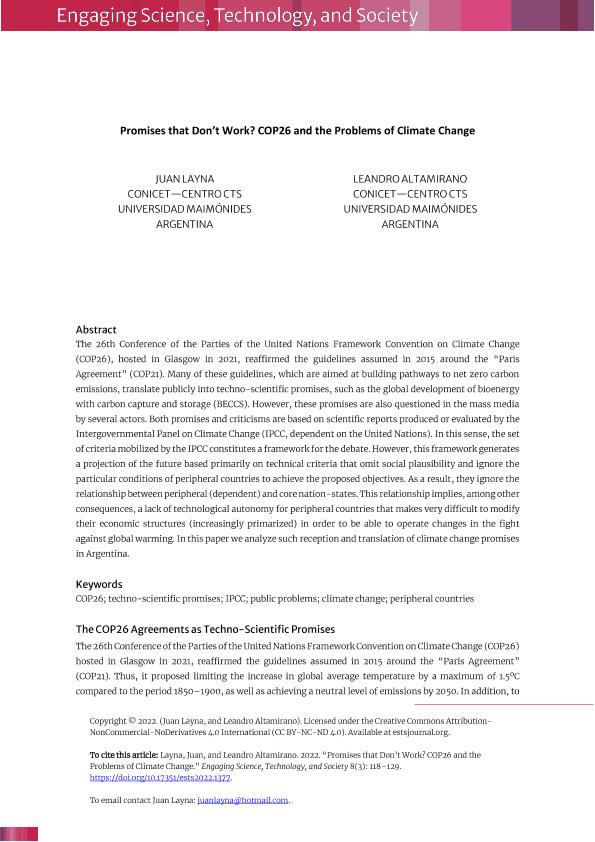Artículo
Promises that Don’t Work? COP26 and the Problems of Climate Change
Fecha de publicación:
12/2022
Editorial:
Society for Social Studies of Science
Revista:
Engaging Science, Technology, and Society
e-ISSN:
2413-8053
Idioma:
Inglés
Tipo de recurso:
Artículo publicado
Clasificación temática:
Resumen
The 26th Conference of the Parties of the United Nations Framework Convention on Climate Change (COP26), hosted in Glasgow in 2021, reaffirmed the guidelines assumed in 2015 around the “Paris Agreement” (COP21). Many of these guidelines, which are aimed at building pathways to net zero carbon emissions, translate publicly into techno-scientific promises, such as the global development of bioenergy with carbon capture and storage (BECCS). However, these promises are also questioned in the mass media by several actors. Both promises and criticisms are based on scientific reports produced or evaluated by the Intergovernmental Panel on Climate Change (IPCC, dependent on the United Nations). In this sense, the set of criteria mobilized by the IPCC constitutes a framework for the debate. However, this framework generates a projection of the future based primarily on technical criteria that omit social plausibility and ignore the particular conditions of peripheral countries to achieve the proposed objectives. As a result, they ignore the relationship between peripheral (dependent) and core nation-states. This relationship implies, among other consequences, a lack of technological autonomy for peripheral countries that makes very difficult to modify their economic structures (increasingly primarized) in order to be able to operate changes in the fight against global warming. In this paper we analyze such reception and translation of climate change promises in Argentina.
Palabras clave:
COP 26
,
TECHNO-SCIENTIFIC PROMISES
,
CLIMATE CHANGE
,
PUBLIC PROBLEMS
Archivos asociados
Licencia
Identificadores
Colecciones
Articulos(SEDE CENTRAL)
Articulos de SEDE CENTRAL
Articulos de SEDE CENTRAL
Citación
Layna, Juan Agustín; Altamirano, Leandro Nicolas; Promises that Don’t Work? COP26 and the Problems of Climate Change; Society for Social Studies of Science; Engaging Science, Technology, and Society; 8; 3; 12-2022; 118-129
Compartir
Altmétricas




